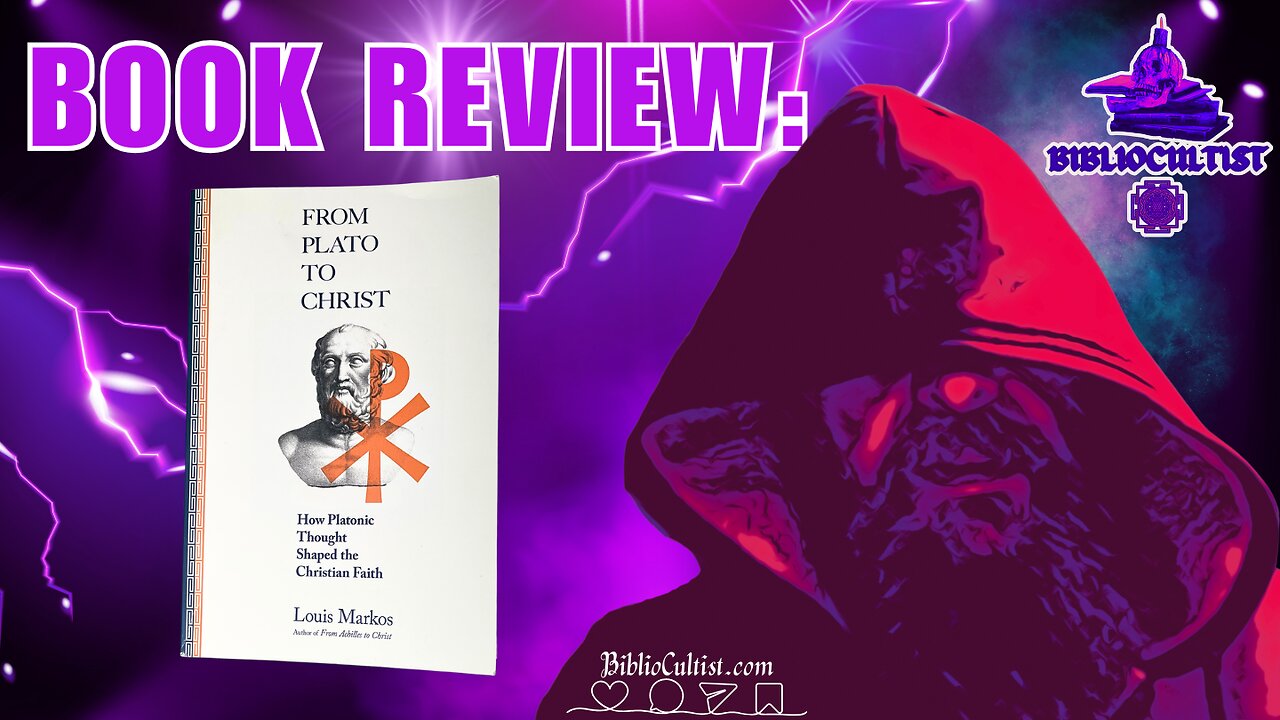Premium Only Content

From Plato to Christ: The Hidden Threads Connecting Philosophy and Faith
*CHECK OUT MY MERCH: https://bibliocultist.printful.me/*
In this thought-provoking video, I delve into Louis Marcos' insightful book 'From Plato to Christ,' which illuminates the profound connections between Neoplatonism and Christianity. Marcos skillfully examines how Plato's philosophy bridges the monistic and pluralistic perspectives on existence, with the material world serving as a reflection of an eternal, ideal realm of forms. Drawing intriguing parallels, I explore the resonances between Plato's ideas and the concepts found in Vedic and Brahminical philosophies. Furthermore, the video sheds light on how Plato's conception of an eternal foundation for social roles and duties influenced Christian notions of social justice and participation.
*all music and content copyright BiblioCultist.com*
#booktube #books #LouisMarcos #FromPlatoToChrist #Neoplatonism #Christianity #Plato #VedicPhilosophy #BrahminicalPhilosophy #SocialJustice #Participation #RadicalDemocracy #biblio #cultist
**SHOW NOTES**
1. Louis Markos is a professor of English and humanities at Houston Baptist University, where he holds the Robert H. Ray Chair in Humanities. A scholar with a focus on classical literature, philosophy, and Christian thought, Markos has authored numerous books exploring the connections between ancient wisdom and modern faith. His works often examine the influence of Greco-Roman and biblical ideas on Western culture, blending literary analysis with theological insight.
2. Philo of Alexandria (c. 20 BCE–50 CE) was a Hellenistic Jewish philosopher who sought to harmonize Jewish Scripture with Greek philosophy, particularly Platonism and Stoicism, through allegorical interpretations. His work reflects how deeply Hellenism had permeated Second Temple Judaism, as Jewish thought increasingly engaged with Greek concepts like the *logos*, divine transcendence, and ethical reasoning. Philo’s synthesis of Judaism and Hellenism not only shaped Jewish theology but also influenced early Christian thinkers, such as Clement of Alexandria and Origen, who adopted his methods.
3. The transition from the Vedic period to the Brahminical period marked a significant evolution in Indian religious and philosophical thought. During the Vedic era, rituals and hymns were central, focusing on deities and cosmic order within the known cosmos. However, with the advent of the Brahminical age, scholars note a shift towards more abstract and metaphysical concepts. The introduction of ideas such as "forms" (rupa) and "ideal worlds" (lokas) signified an expansion beyond the tangible Vedic universe into more speculative realms.
4. The Church of Jesus Christ of Latter-day Saints (LDS Church), founded in 1830 by Joseph Smith in New York, is a Christian restorationist movement that teaches the restoration of the original church established by Jesus Christ. Central to LDS belief is the plan of salvation, which includes the doctrine of preexistence. Mormons believe that all human spirits existed with God before birth, as part of His divine plan.
5. The term "demiurge" originates from ancient Greek philosophy and religion, referring to a divine craftsman or artisan responsible for the creation and shaping of the physical universe. In many traditions, the demiurge is seen as a benevolent intermediary between the transcendent realm of pure ideas or divine essence and the material world. Unlike the Gnostic interpretation, which often casts the demiurge in a negative light, most ancient religions viewed this figure as a constructive force who brings order out of chaos, acting according to a higher divine plan. The concept appears prominently in Platonic philosophy, where the demiurge fashions the cosmos based on eternal Forms, reflecting harmony and purpose.
6. "Faith alone" is the view that salvation is achieved solely through faith, without the necessity of good works or actions. This modern theological theory, which rejects the traditional Christian balance of faith and works, likely emerged due to the influence of nominalism. Nominalism's emphasis on divine will over rational order downplayed the interconnectedness of faith and deeds, paving the way for this doctrine.
7. Origen of Alexandria (c. 185–254 CE) was an influential early Christian theologian and scholar, known for his extensive biblical commentaries and philosophical approach to Christianity. A student of Clement of Alexandria, Origen sought to harmonize Christian teachings with Platonic philosophy. He is famous for his allegorical interpretations of Scripture, emphasizing its spiritual meaning beyond the literal text. Origen also taught the preexistence of souls and a form of universal restoration (*apokatastasis*), suggesting that all creation, including fallen angels, might ultimately be reconciled to God.
-
 LIVE
LIVE
SpartakusLIVE
3 hours agoNONSTOP Snipes, Rockets, and BICEPS = Monday MOTIVATION
280 watching -
 LIVE
LIVE
Rallied
4 hours ago $1.06 earnedSolo Challenges All Day
458 watching -
 LIVE
LIVE
Flyover Conservatives
7 hours agoIs AI Actually Alien Intelligence? Dr. Jason Dean Exposes the Dark Side | FOC Show
248 watching -
 1:47:36
1:47:36
Glenn Greenwald
4 hours agoJD Vance and Rand Paul Clash on Due Process: War on Terror Echoes; Has the U.S. Given Up on Confronting China? Ben Shapiro's Latest Falsehoods About Israel | SYSTEM UPDATE #510
71.3K44 -
 LIVE
LIVE
RaikenNight
1 hour agoExploring the Galaxy of No Mans Sky
30 watching -
 LIVE
LIVE
Spartan
3 hours agoRanked and Expedition 33 (NG+4 and all enemies Set to 10x health)
38 watching -
 LIVE
LIVE
Jokeuhl Gaming and Chat
6 hours agoDARKTIDE - Warhammer 40k w/ Nubes and AoA
57 watching -

Nerdrotic
13 hours ago $2.68 earnedNerdrotic Nooner 513
28.4K2 -

BigTallRedneck
2 hours agoRANKED FINALS W OMEGA
3.71K -
 LIVE
LIVE
Eternal_Spartan
10 hours ago🟢 Eternal Spartan Plays Final Fantasy 7 Rebirth Ep. 3 | USMC Vet | Join the Best Chat on Rumble
52 watching